
- Afhalen na 1 uur in een winkel met voorraad
- In januari gratis thuislevering in België
- Ruim aanbod met 7 miljoen producten
- Afhalen na 1 uur in een winkel met voorraad
- In januari gratis thuislevering in België
- Ruim aanbod met 7 miljoen producten
The Think-Aloud Controversy in Second Language Research
Melissa A BowlesOmschrijving
The Think-Aloud Controversy in Second Language Research aims to answer key questions about the validity and uses of think-alouds, verbal reports completed by research participants while they perform a task. It offers an overview of how think-alouds have been used in language research and presents a quantitative meta-analysis of findings from studies involving verbal tasks and think-alouds. The book begins by presenting the theoretical background and empirical research that has examined the reactivity of think-alouds, then offers guidance regarding the practical issues of data collection and analysis, and concludes with implications for the use of think-alouds in language research. With its focus on a much-discussed and somewhat controversial data elicitation method in language research, this timely work is relevant to students and researchers from all theoretical perspectives who collect first or second language data. It serves as a valuable guide for any language researcher who is considering using think-alouds.
Specificaties
Betrokkenen
- Auteur(s):
- Uitgeverij:
Inhoud
- Aantal bladzijden:
- 184
- Taal:
- Engels
- Reeks:
- Reeksnummer:
- nr. 7
Eigenschappen
- Productcode (EAN):
- 9780415994842
- Verschijningsdatum:
- 12/05/2010
- Uitvoering:
- Paperback
- Formaat:
- Trade paperback (VS)
- Afmetingen:
- 152 mm x 229 mm
- Gewicht:
- 254 g

Alleen bij Standaard Boekhandel
Beoordelingen
We publiceren alleen reviews die voldoen aan de voorwaarden voor reviews. Bekijk onze voorwaarden voor reviews.









